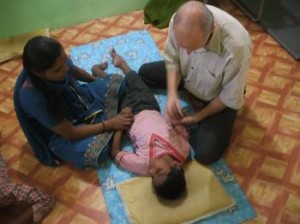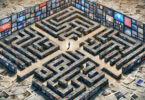By Ian Jarvis
Guest Writer for Wake Up World
It was many years ago, in 1984, that a factory owned by the Union Carbide Corporation (UCC) spewed out a highly toxic gas (41 tonnes of methyl-isocyanate) into the air around a chemical plant. It was just after midnight on the 2/3 December in Bhopal, India.
You will have heard much about current politics (eg the Olympics in London) and legalities so let’s get that out of the way quickly: In 2001 Union Carbide was bought by Dow Chemical and that company refused to take on any responsibility for which UCC may have been liable in Bhopal, despite there being outstanding legal actions. In 2011, seven former local management employees were convicted in the Indian courts but none of the American company senior managers or directors have even faced a court hearing. A court in USA has ruled that they must face charges in India but then refuses to extradite them.
The campaigns for justice and reparation continue from Bhopal with a group of organisations working together under the banner of the International Campaign for Justice in Bhopal. This is the visible side of what is happening and from time-to-time the international press and public hear of their efforts.
But what about the people living there and working in the factory?
That very night thousands of people died, including in spontaneous abortions, in probably the worst industrial disaster in the world. More people have died and will suffer longer than Chernobyl.
One reason for this is that the disaster is not restricted to the gas leak. For years before, the company was dumping toxic wastes around the factory site in inadequate containers. After the incident the site was abandoned to the elements and more containers of chemicals rusted or broke down spilling contents over the ground. With every rainy season these chemicals have been washed through the soil into the groundwater aquifers from where it has been pumped up for drinking, washing, cooking etc, even for children to splash around in.
Through the ensuing years many thousands more have died from illnesses caused by the gas and water and its after effects. After the gas dispersed, those still alive suffered with a wide range of sickness – and still suffer. Rates of asthma, diabetes and cancer are much higher than in the rest of India. The rate of babies born with congenital problems and disability is many times the rest of India.
Even though the local authority of Madhya Pradesh provides a limited number of tankers of water it can be spasmodic and does not reach all the people with affected water supplies.
It is estimated that over 100,000 people are chronically sick from the effects of that night and in addition 30,000 are ill from polluted water, including second and third generation children. Local campaigners estimate that about 500,000 people live in the area of northern Bhopal affected and that some 90+% are effected to a greater or lesser extent.
Most of the people affected are poor and live in slum or semi-slum areas. They cannot afford medical treatment or even to move away. Many are illiterate.
There is only one place they can go that offers free treatment to both water and gas affected people. It is the Sambhavna Clinic which is located near the affected people in the north of Bhopal. Here they can receive care and treatment with a mix of allopathic and ayurvedic therapies (for which they grow most of the herbs), massage and yoga. And they have a great record of success especially with long-term sickness.
Specifically for children there is the Chingari Rehabilitation Centre, created by two winners of the 2004 Goldman Environmental Award (the so called alternative Nobel prize). This supports families of children born with a whole range of problems; cerebral palsy, muscular dystrophy, Downs, learning problems, blindness, deafness, speech defects.
These clinics are funded mainly by public donations through The Bhopal Medical Appeal (BMA) here in the UK. The government of India has approved plans to provide funds but the system is so corrupt it is doubtful how much will reach either clinic. The charity is a small-scale charity operating from a single office in Brighton.
Some Facts that you may not know:
- it was between 3,000 and 15,000 that died on 3 December, depending on who is counting.
- that many pregnant women spontaneously aborted that day and in the following days.
- that at least another 17,000 have died since as a direct result.
- that one person dies every day from the effects. (figures to 2010)
- that many families have only one parent surviving.
- the compensation went to only 573,588 of the victims. About $500 equivalent each.
- the compensation works out to 3p if spread to all the people who should have received it.
- about the thousands of people who breathed the gas and are still suffering from lingering poisoning. (Over 90% of the population of north Bhopal.)
- these people will suffer* for the rest of their lives. And some of them are still in their 20s.
- about the water pollution because toxic chemicals dumped on and around the site have been washed into the ground water source.
- that these poisonous chemicals and heavy metals are still being washed into the soil and spreading the water pollution by 200 metres every year.
- that people still have to drink this water.
- that babies born to parents exposed to the gas or water are several times more likely than babies in the rest of India to have some form of congenital malformation**.
- that no-one knows when this inheritance will stop. If ever. Probably never.
- that Dow Chemical bought UCC in 2001 and refuses to accept any liability.
- that Dow still will not tell the Indian Government the exact gases to which people were exposed to and their effects on the body.
* Health problems include lung and breathing problems, many gynaecological issues including sterility, blindness. Cancer rates are high, diabetes rates are high, asthma rates are high.
**The range of congenital disability is wide and mostly on the spectrum of Cerebral Palsy, including physical deformity, Down syndrome (Trisomy 21), deafness, learning disability, developmental problems.
- local hospitals are giving out pharmacological drugs not knowing if they will work and not concerned about the potential side effects.
- some hospitals are effectively carrying out drug trials on these unknowing people.
- the Sambhavna Trust Clinic is the only medical facility where victims of water pollution as well as those with gas after effects can receive treatment, free of charge.
- the Chingari centre is the only place where parents exposed to the gas or groundwater can get help, education and treatment for their disabled children, free of charge.
- Sambhavna and Chingari are funded solely by charity and personal donations.
Please help the people.
In August 2011, I spent three months at the clinics in Bhopal, working alongside the staff there, offering therapy treatments at both Sambhavna and Chingari. I have written a book about my experiences with some thoughts and musings about life there and treatment. By buying a copy of my book you will be helping the two clinics of Sambhavna and Chingari to continue and even expand their work.
About the Author
Ian Jarvis is a complementary therapist from the UK. He spent 30+ years working in IT and consultancy before his brains hurt and he switched to a much more useful occupation. He practices Spineworks and Reiki and can be contacted via his website at spineworks.eu or [email protected]

If you've ever found value in our articles, we'd greatly appreciate your support by purchasing Mindful Meditation Techniques for Kids - A Practical Guide for Adults to Empower Kids with the Gift of Inner Peace and Resilience for Life.
In the spirit of mindfulness, we encourage you to choose the paperback version. Delve into its pages away from screen glare and notifications, allowing yourself to fully immerse in the transformative practices within. The physical book enriches the learning process and serves as a tangible commitment to mindfulness, easily shared among family and friends.
Over the past few years, Wake Up World has faced significant online censorship, impacting our financial ability to stay online. Instead of soliciting donations, we're exploring win-win solutions with our readers to remain financially viable. Moving into book publishing, we hope to secure ongoing funds to continue our mission. With over 8,500 articles published in the past 13 years, we are committed to keeping our content free and accessible to everyone, without resorting to a paywall.







